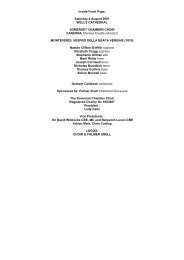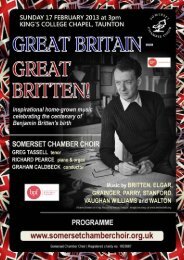to view the concert programme - Somerset Chamber Choir
to view the concert programme - Somerset Chamber Choir
to view the concert programme - Somerset Chamber Choir
You also want an ePaper? Increase the reach of your titles
YUMPU automatically turns print PDFs into web optimized ePapers that Google loves.
IntroductionHe who binds <strong>to</strong> himself a JoyDoth <strong>the</strong> wingèd life destroyBut he who kisses <strong>the</strong> Joy as it fliesLives in Eternity’s sunrise.William BlakeEternity’sSunriseOn first seeing <strong>the</strong> flier advertisingthis <strong>concert</strong>, some people perhapsmay have thought, ‘what on earthdoes <strong>the</strong> title mean? What connectionhas an enigmatic quotation fromWilliam Blake with a choral <strong>concert</strong>?’.I hope that some of <strong>the</strong>se are herethis afternoon, and not only here,but also now reading thisintroduction, for I should like briefly <strong>to</strong> attempt <strong>to</strong> explain whyI felt that Eternity’s Sunrise is not only an evocative title for this<strong>concert</strong>, but also one that is deeply appropriate.Blake felt that joy is destroyed if one is possessive of it and doesnot share it. Undoubtedly, this is true of <strong>the</strong> joy of performingand listening <strong>to</strong> music. Composers and performers do notgenerally write for, or play <strong>to</strong>, <strong>the</strong>mselves, but, instead, seek <strong>to</strong>communicate human emotions through <strong>the</strong>ir music making <strong>to</strong>an audience - whe<strong>the</strong>r of two or three individuals, or even ofhundreds. They know that <strong>the</strong> ‘wingèd life’ of music must beshared if it is <strong>to</strong> continue <strong>to</strong> thrive.This year <strong>the</strong> <strong>Somerset</strong> <strong>Chamber</strong> <strong>Choir</strong> celebrates its 20thAnniversary - 20 years of giving public <strong>concert</strong>s, 20 years oftrying <strong>to</strong> ‘kiss <strong>the</strong> joy’, of relishing great music from manycountries and many centuries and <strong>the</strong>n trying <strong>to</strong> communicate<strong>the</strong>ir joy in music <strong>to</strong> audiences in <strong>Somerset</strong> (and a few inDevon, Cornwall , Dorset , Ripon, Worcester and London,<strong>to</strong>o!).Fly it certainly has - and I don’t just mean <strong>the</strong> joy, or even <strong>the</strong>time. Hours of effort can be expended on a particularly difficultpassage in a work, which takes only seconds <strong>to</strong> perform in a<strong>concert</strong> - perhaps captured on a recording, but in reality,vanished in<strong>to</strong> <strong>the</strong> e<strong>the</strong>r. A slightly crazy activity some may think,but those sounds, that music, has become part of <strong>the</strong> experienceof each of us, rooted in our memory forever.But <strong>the</strong> <strong>concert</strong> title is not really about <strong>the</strong> choir, but, ra<strong>the</strong>r,about <strong>the</strong> fact that, through music, we are all enabled <strong>to</strong> lookbeyond ourselves, <strong>to</strong> experience a vision and even <strong>to</strong> betransformed by this extraordinary art. T S Eliot wrote ‘you are <strong>the</strong>music while <strong>the</strong> music lasts’, and this is a thought-provoking andinsightful statement which certainly demands our consideration.Music is outside <strong>the</strong> day-<strong>to</strong>-day, <strong>the</strong> mundane - it is literallybeyond us - and that is its point. And yet music can engage ourhearts and minds powerfully and change us forever.Eternity is of course beyond our experience and our grasp hereon earth, but perhaps we can fleetingly glimpse its ‘sunrise’ byperforming and listening <strong>to</strong> music.I could have written a very different introduction <strong>to</strong> this<strong>concert</strong>, pointing out <strong>the</strong> many specific moments when eternity,and light emerging out of darkness, are referred <strong>to</strong> in <strong>the</strong> texts,or perhaps picking out <strong>the</strong> ways in which <strong>the</strong>se images areevoked in sound. However, perhaps it is best if each of is allowed<strong>to</strong> discover <strong>the</strong>se moments individually, without followingsomeone else’s road map.So, let us all attempt <strong>to</strong> kiss ‘<strong>the</strong> joy as it flies’, for if we are eachable <strong>to</strong> do so on this dark winter’s afternoon, our lives will beenhanced and enriched and thus changed. Our <strong>concert</strong> is ofmusic by American and British composers, and I’d like <strong>to</strong> finishthis introduction with an American poem about transformation,an extract from an English sermon and <strong>the</strong> closing lines ofMil<strong>to</strong>n’s At a solemn music, all of which strikingly express what Iam trying put across.Graham Caldbeck~THE MAN WITH THE BLUE GUITARThe man bent over his guitar,A shearsman of sorts. The day was green.They said, ‘You have a blue guitar,You do not play things as <strong>the</strong>y are.’The man replied. ‘Things as <strong>the</strong>y areAre changed upon <strong>the</strong> blue guitar.’And <strong>the</strong>y said <strong>the</strong>n, ‘But play, you must,Tune beyond us, yet ourselves,A tune upon <strong>the</strong> blue guitarOf things exactly as <strong>the</strong>y are.’Wallace Stevens~To listen seriously <strong>to</strong> music and <strong>to</strong> perform it are among ourmost potent ways of learning what it is <strong>to</strong> live with and beforeGod, learning a service that is a perfect freedom...In this‘obedience’ of listening and following, we are stretched anddeepened, physically challenged as performers, imaginatively aslisteners. The time we have renounced, given up, is given back <strong>to</strong>us as a time in which we have become more human, more real,even when we can’t say what we have learned, only that we havechanged.Dr. Rowan Williams - Archbishop of Canterbury[Taken from a sermon written for <strong>the</strong> Three <strong>Choir</strong>s Festival and quoted by JamesMacMillan in an article on <strong>the</strong> role of music in our ‘post-religious’ times,published in The Guardian on Saturday July 19, 2003]~O may we soon again renew that song,And keep in tune with Heav’n, till God ere longTo His celestial <strong>concert</strong> us unite,To live with Him, and sing in endless morn of light.John Mil<strong>to</strong>n At a solemn music












